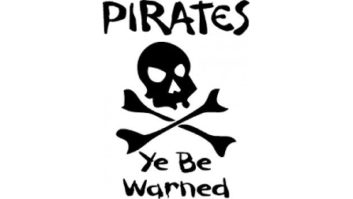The FCC is clearing its decks, so to speak, of pirate fines.
In two days, the commission has announced or upheld a total of $67,000 in fines to four people for operating unlicensed radio stations in separate cases, and it issued another $4,000 proposed fine to one ham operator for using an unauthorized frequency.

Books by iStockphoto Rafa Irusta
Two Boston-area cases progressed to the level of forfeiture orders because the FCC says neither Robert Brown nor Lloyd Morris responded to Notices of Apparent Liability for $15,000 each. The notices were issued to Brown and Morris in October of 2010. They have 30 days to pay or the FCC says it may turn the cases over to the Justice Department for collection.
The next two cases occur in Florida. The FCC decided Fritzner Lindor is apparently liable for a $15,000 fine after Tampa office agents traced an unauthorized signal operating on 94.7 MHz in Orange Park to his home. During an inspection in June of 2010, the commission says he admitted he bought a transmitter and operated the station without a license. Involved in broadcasting for 19 years, he knew his actions violated the Communications Act, according to the agency. He has 30 days to appeal or pay.
In the second Florida case, the commission issued a proposed fine to Judith V. Smith of $22,000 for operating an unlicensed radio transmitter on 95.9 MHz in Miami, and for refusing to allow FCC agents to inspect the station, located in her home. “Gospel Reggae FM” also has a website named “Gospel Reggae FM.com.” In June of 2010, agents traced an unauthorized signal to her home. They say she opened the door, identified herself and refused to let them in. She then closed the door and turned off the transmitter. She has 30 days to appeal.
Finally, another fine is in a ham radio case. The commission affirmed a proposed fine of $4,000 against Jose Torres for operating his amateur station on an unauthorized frequency, 26.71 MHz. Torres is the licensee of Amateur Extra Class station N3TX in Philadelphia. The agency says he’d been warned about not operating on that frequency and fined $4,000 in 2009. He asked that the fine be reduced or cancelled, telling agents he wasn’t home during the alleged unauthorized operations in 2008 and submitted cellphone records to support his claim; Torres also submitted three years of federal tax returns to bolster his argument of an inability to pay. The FCC didn’t buy his arguments; field agents say they heard his voice on the unauthorized transmissions and that the cellphone records don’t prove he wasn’t at home, only that he wasn’t using his landline at the time.
— Leslie Stimson










